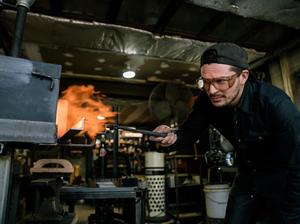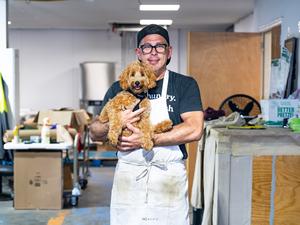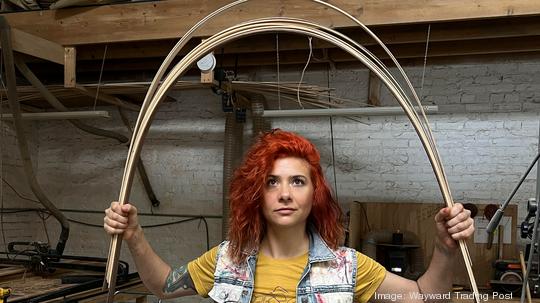
There’s an old saying often attributed to American naturalist John Burroughs: “Leap and the net will appear.” For Tina Lewis, that net came in a literal form: a fishing net.
Lewis, who grew up in Delaware County, decided to take a leap one year ago, leaving behind the security of her longtime employer AmerisourceBergen. After 15 years with the Conshohocken-based drug wholesale giant – where she began in entry level accounting and worked her way up to various director roles – Lewis was ready for a change. The move was prompted, in part, by restructuring at the company, but also by the so-called Great Resignation. Seeing the millions of Americans who voluntarily left their jobs in pursuit of something different, she decided to follow suit.
Last August, Lewis took on her fishing net business Wayward Trading Post full-time. She had established Wayward formally at the end of 2019 and worked on it part-time during the intervening 18 months.

Wayward is currently based in the Frankford neighborhood of Philadelphia at 4313 Tackawanna St. – though Lewis plans to relocate to Delaware County in the coming months.
The company brings together Lewis’ wide-ranging skillset and came about somewhat by chance. In 2019, a friend asked Lewis and her husband Justin, who works in digital and media marketing but has extensive wood bending skills, if they would craft a fly fishing net.
They agreed and throughout the design and creation process shared photos online and were surprised by the interest it evoked. “It was really just one of those moments where it was an organic realization that this could be a thing,” Lewis recalled. “I filed the business paperwork the moment I saw the completed net.”
While Lewis was eager to leap into business, she wasn’t immediately eager to leave the safety net of a corporate job.
Things began shifting when the Covid-19 pandemic struck. No longer traveling for work on a weekly basis, Lewis had time to reconnect with nature – and her business. Like fishing, the great outdoors harkened back to her childhood when her parents encouraged Lewis and her brother to explore. Their father would take them fishing, camping and occasionally hunting. While she grew up using spinners for fishing, creating nets felt natural so she focused more of her energy there.
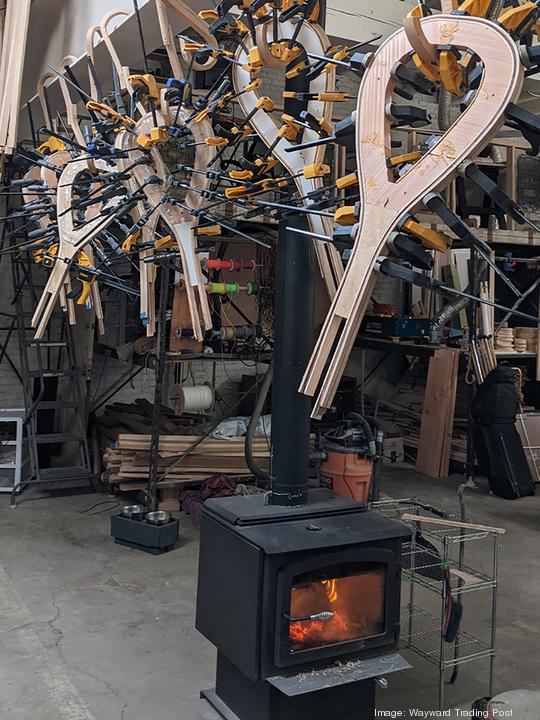
It's been one year since Lewis made that leap to Wayward – which has been self-funded – full-time and in those 12 months she has doubled business and is now setting her sights on her next product line. Like the fly fishing nets, it will also be an extension of the leisure sport segment.
Her newest venture is focused on a segment within the world of racket sports, court tennis. The sport dates back hundreds of years and is particularly niche, with just 11 courts in the U.S. and some 50 odd courts scattered around the globe. The Racquet Club of Philadelphia has one of those courts and approached Lewis earlier this year about prototyping a racket, which she is currently developing.
As with certain racket sports, players use both the floor and walls. Rackets are smaller than those used in tennis and for centuries were traditionally made of wood.
She sees this new venture as a jumping off point to enter into other sports.
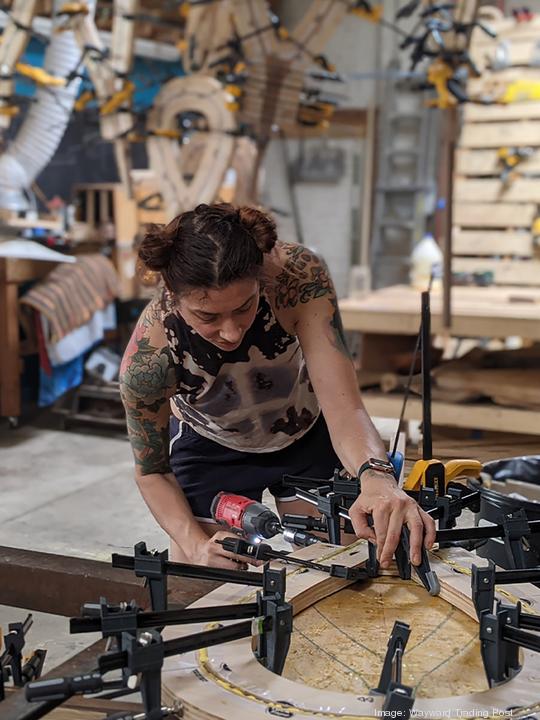
“I really think that there's an opportunity here to create a company that provides niche handcrafted sporting goods,” she said. “There's a market out there that wants to invest in a really good quality pieces for their hobby sport.”
Beyond racket sports, Lewis is considering how she could expand into trophy-like pieces. “One of the opportunities that I think that we have is not just providing equipment for a player but also providing equipment for gifts, like prop products that people can keep on their mantel,” she said.
Part of the appeal of Lewis’ hand-crafted work is the artistry that goes along with it. A self-trained artist, Lewis adorns her custom creations with individualized artwork inspired by its owner and their interests.
Such custom nets run from a low of $225 a piece up to about $475. Coming from a self-described blue-collar family, it’s important to Lewis that she also offer a more accessible price point. As such, she introduced what she has called the “Classic” line of nets, which are retail ready and sell for $175.
Wayward sales come from all over the U.S. and Lewis said about 60% are from the Classic line.
Nets come in various woods like walnut, cherry or hickory, all sourced from Lancaster. She has also added fly boxes, something her husband crafted.
After she relocates, Lewis said she is considering bring on her first hire come 2023.
Where did your interest in art come from?
My dad always had a bunch of hobbies. One of his hobbies was he loved sci-fi and comic books and he loves to play this game called Magic the Gathering. Every Saturday, he would go to the Granite Run Mall and there was this tiny comic shop and then there was this electronics boutique gaming store in there. He'd hang out with his buddy and then they would play card games, so my brother and I would sit on the floor and read comic books. As I got older, I would start drawing the characters. My mom is super artistic. She was super encouraging.
Why other leisure sports?
I think that there's a big opportunity to create an organization that can supply high quality goods that are made in the U.S.A., and I think that's become my target. What are areas of opportunity that I can take art and a high level competent woodworking skill set and implement that across other leisure sports? When I chose the company name Wayward Trading Post, it was really with the intention to expand into other [segments].
What sorts of sports might you branch into?
Right now, it's anything that's woodworking because I think that is how we can prototype competently and provide competent and quality goods. I don't think modern tennis, but I do think that racquetball and badminton and those types of things. I definitely think that there's opportunity in all of those, even pickleball.
